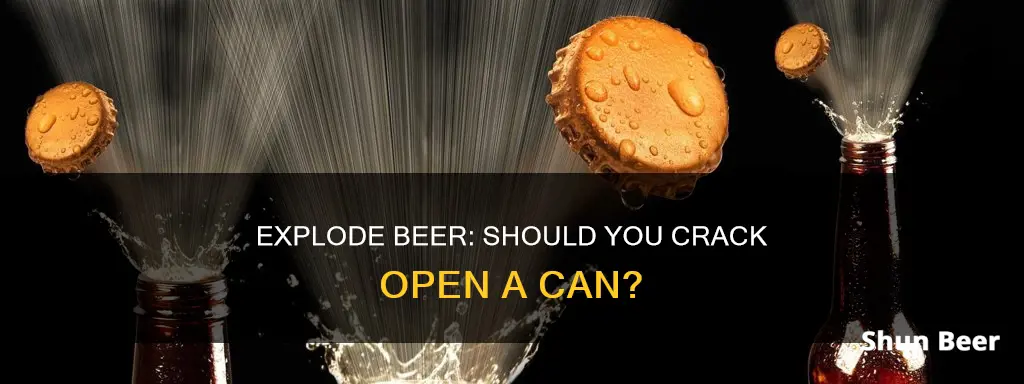
Drinking beer is a pleasure for many, but the question of whether or not to drink an exploding beer is a tricky one. Exploding beer is not a new phenomenon and can occur due to various reasons, such as overcarbonation, temperature changes, and even the addition of fruit. While it may seem like a rare occurrence, it is essential to understand the potential risks and how to prevent and handle such situations. So, should you drink that can of exploding beer? The answer is complex and depends on several factors.
| Characteristics | Values |
|---|---|
| Cause of explosion | Overcarbonation, exposure to heat, dropping the can, damage during shipping |
| Prevention | Keep out of direct sunlight, store in a cool place, refrigerate, drink fresh |
| Risk factors | Fruit content, yeast, sugar content, temperature |
| Potential consequences | Loss of beer, injury, product recall, lawsuits |
What You'll Learn

What causes beer cans to explode?
Beer cans can explode due to a combination of elevated temperatures and excessive carbonation. While can manufacturers supply quality standards that define buckle resistance and the ability to withstand elevated pressures and temperatures, the presence of excessive carbonation can cause a can to burst.
Carbonation levels in beer are typically between 1.5 and 2.6 volumes, but highly carbonated beers can reach 4.0 volumes, requiring specialised bottles with caged corks to contain the pressure. When a beer warms, it loses carbonation as the carbon dioxide comes out of the beer and into the headspace of the can, increasing pressure. However, this is usually expected and accounted for in can design.
Exploding beer cans are often caused by excessive carbonation, which can be the result of refermentation by yeast or spoilage microorganisms after packaging. Small breweries that use mobile canning units, package unfiltered and unpasteurised beer (containing active yeast), or have contaminating microorganisms are at the highest risk of refermentation. To prevent this, beer should be fully fermented before packaging, and the addition of unfermented fruits and extracts to unfiltered beer should be avoided, as this can lead to refermentation.
Additionally, dry hopping has been linked to refermentation due to the presence of glycolytic enzymes, which can convert unfermented polysaccharides into simple, fermentable sugars. Contamination with wild yeast or bacteria can also lead to excessive carbonation and, ultimately, exploding cans.
In summary, while beer cans are designed to withstand normal carbonation levels and elevated temperatures, the combination of excessive carbonation and increased temperature can cause a can to burst. Brewers and consumers both play a role in ensuring the safe storage and handling of beer to prevent refermentation and the associated risks of exploding cans.
Jaundice Recovery: Beer Consumption and Your Health
You may want to see also

What are the dangers of exploding beer cans?
Beer cans can explode due to a variety of factors, and these explosions can cause harm to consumers. The primary cause of exploding beer cans is excessive carbonation, which occurs when there is refermentation by yeast or spoilage microorganisms after packaging. This can be due to unfermented fruits and extracts added to unfiltered beer before packaging, dry hopping, or contamination with wild yeast or bacteria. Sunlight exposure and excessive temperatures can also contribute to exploding beer cans.
The dangers of exploding beer cans include the risk of serious injury to consumers. In one case, a bartender in New York City was permanently blinded when an unopened beer bottle exploded. Additionally, exploding beer cans can cause property damage and lead to lost revenue for breweries and retailers.
To prevent exploding beer cans, breweries must take several steps. Firstly, all beer should be fully fermented before packaging to prevent refermentation. Secondly, dry hopping should be avoided, as it can cause refermentation. Finally, breweries should ensure that their products are free from contamination with wild yeast or bacteria.
Consumers also play a role in preventing exploding beer cans. It is important to follow storage instructions, such as keeping the beer cold and avoiding direct sunlight and excessive temperatures. By taking these precautions, the risk of exploding beer cans can be significantly reduced.
Overall, the dangers of exploding beer cans include the potential for serious injury, property damage, and financial losses. By taking the necessary precautions during the brewing and packaging process, and by following proper storage instructions, the risk of exploding beer cans can be mitigated.
Beer After a Colonoscopy: What You Need to Know
You may want to see also

How to prevent exploding beer cans
Drinking an exploded beer is not advisable, and it is important to know how to prevent beer cans from exploding.
Firstly, it is important to keep beer cans out of direct sunlight and store them in a cool environment. This is because carbon dioxide (CO2) gas is very soluble in beer, and as the temperature increases, gas solubility decreases. When a beer warms, it loses carbonation as the gas comes out of the beer. In a closed container, the CO2 has nowhere to go but the headspace of the can, so the pressure increases and can cause the can to explode.
Secondly, accurate fill volumes are essential to prevent beer cans from exploding. The typical headspace for a standard 12 oz can is 0.47 inches (12 mm). Excessive carbonation can be caused by contamination with wild yeast or bacteria, so a thorough micro-program is recommended before canning operations.
Thirdly, it is important to prevent refermentation by yeast or spoilage microorganisms after packaging. This can be done by ensuring that all beer is fully fermented at terminal gravity before packaging and by avoiding the addition of unfermented fruits and extracts to unfiltered beer.
Finally, it is recommended to avoid dropping or shaking beer cans, as this can cause them to explode.
Beer and Rudraksha: A Spiritual Conundrum?
You may want to see also

What to do if you have accidentally frozen your beer
If you have accidentally frozen your beer, the first thing to check is whether the beer can or bottle has become unsealed. When liquid freezes, it expands, which can cause the seal to rupture. If the seal is broken, the beer will likely be flat once it has thawed, and you will miss out on the carbonation.
If the seal is still intact, your beer will likely taste normal once it has returned to an average temperature. To defrost your beer, place it in a Ziploc bag or container to avoid a mess if it leaks. Then, put the beer in a cool place, like the fridge, and let it sit until it has defrosted. This can take between 12-24 hours. Avoid running glass bottles under hot or warm water, as the glass may expand too quickly and break.
If you plan on drinking your previously frozen beer, make sure to let it thaw completely. If you drink it before it is fully thawed, the liquid you drink first will be straight alcohol, as water stays frozen longer than alcohol. You will also want to let your beer thaw to avoid "chill haze," which refers to the opaque sheen a frozen beer can give, as well as floating bits and chunks in the beverage.
Is Drinking Old Beer Safe?
You may want to see also

What to do if you drop a beer can
Dropping a beer can is not ideal, especially if the can has been shaken up or disturbed. Here is what you should do if you drop a beer can:
- Inspect the can for any damage: Depending on the height of the fall and the surface it landed on, the can may have sustained some damage. Carefully check the can for any dents, scratches, or signs of leakage.
- Ensure the can is intact: If the can appears undamaged, gently shake it to listen for any signs of liquid movement inside. If you don't hear anything, the can is likely still sealed and safe to consume.
- Open with caution: If the can looks and feels intact, proceed to open it, but do so with caution. Point the can away from your face and body, and slowly release the tab. If the can is overcarbonated, it may release foam or spray when opened, so be prepared for potential fizzing.
- Check for unusual odours or tastes: Before consuming the beer, take a moment to inspect it for any unusual odours or visible signs of contamination. Take a small sip to check for any strange tastes or textures. If anything seems off, it's best to discard the beer.
- Store in a cool place: If the can has survived the drop without any apparent issues, it's best to store it in a cool place, ideally a refrigerator, to maintain its freshness and reduce the risk of explosion due to heat.
It is important to note that dropping a beer can may increase the risk of it exploding, especially if the can is already damaged or overcarbonated. Always handle beer cans with care and follow storage instructions to minimise the risk of explosion or leakage.
Beer and pH Balance: Is It Safe to Drink Beer?
You may want to see also
Frequently asked questions
No, you should not drink a can of exploded beer. Drinking beer from a can that has exploded could be dangerous as there may be shards of metal or glass in the liquid.
If you have a can of exploded beer, the best thing to do is to throw it away. Do not attempt to clean up the spillage as it will be very sticky and difficult to remove.
Cans of beer can explode due to a build-up of carbon dioxide, which occurs when the beer is put under pressure. This can be caused by high temperatures or overcarbonation.
To prevent cans of beer from exploding, keep them out of direct sunlight and store them in a cool environment. Additionally, avoid dropping the cans as this can also cause them to explode.







